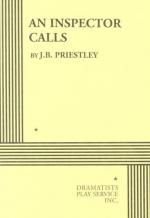
|
Lesson 1 (from Act One, pp. 5-15)
Objective
The first part of the play is full of dramatic irony. Dramatic irony occurs when the audience knows something that the characters do not realize. The objective of this lesson is to discuss the various types of dramatic irony presented in the introduction to the play.
Lesson
Group Discussion: What does Sheila’s teasing of Gerald about his neglect of her the previous summer foretell what might happen later in the play? What is ironic about Arthur's statements that Gerald and Sheila are marrying at “a very good time” (9), “there isn’t a chance of war” (10), there is a “new liner” that is “unsinkable” (10), and Russia is “behind-hand” (10)? What is ironic about Arthur’s statement that he may receive a knighthood if all goes well and as long as the family doesn’t “start a scandal” (11)? What might Eric’s drinking foretell about what happens later...
Aligned to the following Common Core Standards:
- ELA-Reading: Literature RL.9-10.2, 9-10.4, 9-10.10, 11-12.2, 11-12.4, 11-12.10
|
This section contains 4,619 words (approx. 16 pages at 300 words per page) |

|




